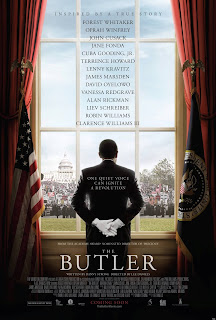 |
| Lee Daniels’ The Butler |
 |
| Cecil and Gloria. |
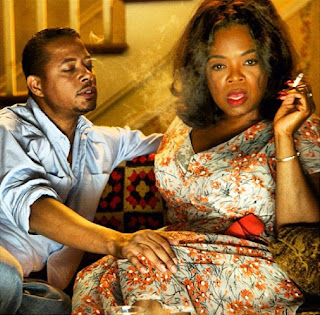 |
| Gloria is unhappy and has an affair. |
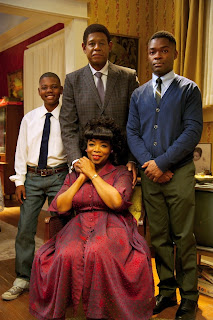 |
| Cecil and Gloria with Lewis (right) and Charlie (left) |
 |
| Cecil confronts Lewis after he is first sentenced to jail. |
The radical notion that women like good movies
 |
| Lee Daniels’ The Butler |
 |
| Cecil and Gloria. |
 |
| Gloria is unhappy and has an affair. |
 |
| Cecil and Gloria with Lewis (right) and Charlie (left) |
 |
| Cecil confronts Lewis after he is first sentenced to jail. |
More Behind-the-Scenes Inequality in the Trek Series at Trekkie Feminist
What have you been reading/writing this week? Tell us in the comments!
More Behind-the-Scenes Inequality in the Trek Series at Trekkie Feminist
What have you been reading/writing this week? Tell us in the comments!
It’s Not Easy for Black Celebrities Like Raven-Symoné to Come Out by Allison Samuels via The Daily Beast
Women Directors Take Record Number of Emmy Nods, If Not TV Jobs by Amy Dawes via The Los Angeles Times
She Did That! Issa Rae Brings ‘Awkward Black Girl’ to HBO via Madame Noire
The Banal, Insidious Sexism of Smurfette by Philip Cohen via The Atlantic
More Leading Roles for Asian Actresses Shows Hollywood’s (Slow) Progress by Vera H-C Chan via Yahoo! Movies
‘Orange is the New Black’ Offers New Opportunity to Discuss Trans* Issues by Mychal Denzel Smith via Feministing
It’s Not Easy for Black Celebrities Like Raven-Symoné to Come Out by Allison Samuels via The Daily Beast
Women Directors Take Record Number of Emmy Nods, If Not TV Jobs by Amy Dawes via The Los Angeles Times
She Did That! Issa Rae Brings ‘Awkward Black Girl’ to HBO via Madame Noire
The Banal, Insidious Sexism of Smurfette by Philip Cohen via The Atlantic
More Leading Roles for Asian Actresses Shows Hollywood’s (Slow) Progress by Vera H-C Chan via Yahoo! Movies
‘Orange is the New Black’ Offers New Opportunity to Discuss Trans* Issues by Mychal Denzel Smith via Feministing
 |
| How to Lose Your Virginity poignantly points out that in our culture, if you are a woman and have sex, you’re doomed, and if you don’t have sex, there’s something wrong with you. |
My favorite part of this film is that it is upbeat from start to finish. There’s no anger, there’s no judgment. I don’t want to riff on the “angry feminist” stereotype, but I know I tend to get pretty worked up and, well, angry when I talk about our culture’s toxic obsession with female sexuality and expectations of virginity. Shechter’s ability to teach, dismantle, expose and explore is remarkable. The audience is left with newfound knowledge with which they can criticize myths of virginity in our culture. However, the audience is also left with respect for everyone’s stories–those who are remaining virgins (no matter their personal definition), those who don’t and those who have no idea what it all even means. When a documentary can do that, it succeeds in a big way.
 |
|
The phrase “purity balls” will never not make me giggle.
|
Throughout How to Lose Your Virginity, Shechter establishes common ground and values every individual’s experience, criticizing only the cultural myths that make us feel fear and shame about our sexuality. Even when she tackles pornography and purity balls, she does so with respect and cultural criticism, not disdain.
 |
| The Grey Area: Feminism Behind Bars promotional still. |
“I wanted to make a documentary about my experience there because I had a feeling that teaching a feminism class at the women’s prison would be a good framework to talk about women’s issues in the criminal justice system in general and to bring the stories of these women to the public through this film.”
 |
| The documentary was filmed at the Iowa Correctional Institute for Women. |
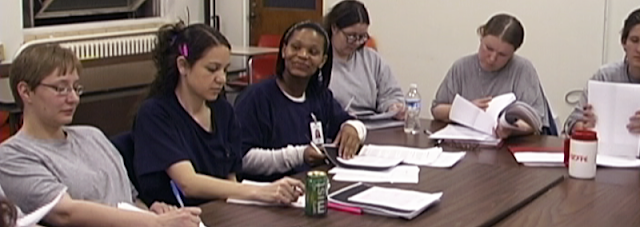 |
| These women’s stories were highlighted throughout the documentary. |
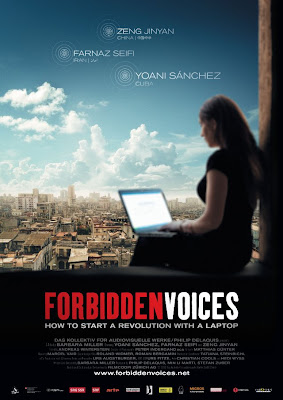 |
| Forbidden Voices movie poster. |
Written by Leigh Kolb
 |
| Yoani Sanchez |
 |
| Farnaz Seifi |
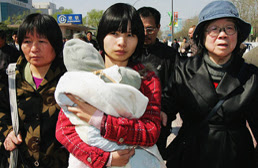 |
| Zeng Jinyan |
Forbidden Voices is a selection from Women Make Movies, an organization that “facilitates the production, promotion, distribution and exhibition of independent films and videotapes by and about women.”
 |
| Salmai movie poster. |
Written by Leigh Kolb
 |
| Salma, a Tamil poet and politician. |
 |
| Salma still must confront resistance from her family and the next generation. |
So here it is, ten female characters that I find unique and fascinating, and unfortunately, often overlooked (please add any more you think of in the comments).
 |
| Katee Sackhoff as Starbuck in Battlestar Galactica |
She smoked cigars and drank to excess, got into a lot of fights, struggled with commitment, but loved her husband and friends deeply. She was fearless and talented as a pilot, but conversely sensitive to music and painting because of her relationship with her absent father.
Moore gave her a pretty intense back story as well, showing the physical and mental abuse that her mother submitted her to as a child, and her struggles with pain, having children, and the intense developments her character was subjected to.
 |
| Robin Weigert as Calamity Jane and Kim Dickens as Joanie Stubbs in Deadwood |
Robin Weigert was masterful as the blustering, loyal, drunk Calamity Jane, managing to display both bravado and a deep frailty. Weigert consistently portrayed Jane’s insecurities and sadness, effectively showing her as a sensitive and lonely outcast.
Joanie Stubbs (Kim Dickens) was an elegant whore who has spent her whole life under the physical and sexual control of men, first her father, then her unstable and dangerous boss, Cy Tolliver. But Joanie’s search for freedom and escape from her past life became very painful and difficult to survive and understand her own place in the Deadwood camp.
The fact that the two women, both on the fringes of acceptable society, both damaged and distraught, find each other and develop a strong friendship (with it growing into a possible romantic one) was a beautiful subplot for the show.
 |
| Julia Louis-Dreyfuss as Selina Meyer in Veep |
But there is something very important about such unrelatable and unlikable characters–not all women in the world are pleasant, but despite her flaws, Selina is a deeply human character in a competitive world.
 |
| Yunjin Kim as Sun Kwon in Lost |
Sun, at least in the beginning of Lost, seemed to be a minor character, one whose sad smile and soft voice suggested a submissive and lackluster personality being pushed around by her husband. Of course, that wasn’t the case, and it became apparent through later episodes that she was a strong, intelligent, forceful character, willing to do what was needed in order to survive.
Sun’s character and backstory provided a fabulous look into how humans change, seeing her first as the sweet, naïve bride, then the angry, bitter woman desperate for her freedom, and finally as a strong survivor in later seasons.
 |
| Maggie Siff as Tara Knowles in Sons of Anarchy |
But then she changes and starts to exhibit a darker side, a change that heralds in her own deep conflicts with her healing career but destructive personal life. In season five she takes a wrench to another woman for possibly endangering her husband; a few episodes later she’s performing delicate surgery on an infant.
 |
| Liza Weil as Paris Geller in Gilmore Girls |
One of these characters being of course, the hyper-intelligent, aggressive, irrepressible, intense Paris Geller. Originally, Paris was only intended for a few episodes in the first season, but quickly grew into a main character because of the unique perspective that her personality offered to the show.
Paris’ character, that of an elitist academic loaded with money, quick temper, and fast-talking, clever comebacks, can’t really be found in any other show. She was a mashup of brilliance and so many neuroses and problems that it’s almost overwhelming, but also funny and sad.
The truth is, women like her, passionate, intense and bossy, are often completely hated and overly stereotyped, whereas Gilmore Girls managed to present her as a lovable and competent women, albeit with a few idiosyncrasies.
 |
| Rutina Wesley as Tara Thornton in True Blood |
Intelligent and well-read, but dealing with her mother’s alcoholism (and intense religiosity) and poverty, makes Tara full of emotional issues and anger, but also passionately loyal. Tara is astute and honest and not afraid to tell other characters when they’re being stupid. The world probably needs a lot more people like her.
 |
| Natalie Dormer as Margaery Tyrell in Game of Thrones |
Margaery is an incredible politician; she’s manipulative, cold, ambitious, charismatic and astute. I love how each action is carefully planned out, revealing a methodical and calculating nature, one that is far more dangerous than Cersei (I think) because of her ability to control her temper.
I love a good ambitious character; powerful women who aren’t afraid to get their hands dirty fascinate me. In fact, I would argue that Margaery Tyrell is a born leader, one with an innate understanding of politics and power.
Vote for Margaery?
 |
| January Jones as Bretty Francis Draper in Mad Men |
Rather than sugarcoating her character and painting her as a distressed angel, Betty builds upon the difficulties that pushed her way, and her flawed decisions are thrown in with attempts to pull her life together.
Sometimes redemption is hard; so is pulling yourself out of cycles of pain and resentment. Betty is therefore complex and interesting, incredibly frail and static, but also unbending and aggressive in her life choices.
 |
| Nicolette Sheridan as Edit Britt in Desperate Housewives |
However, she was also hilarious, clever, and often incredibly honest and realistic. She made no bones about who she was or her actions, and more than once was the voice of reason.
And sometimes, there’s nothing wrong with being a little selfish.
 |
| Kristen Wiig as Imogene in Girl Most Likely |
Written by Lady T.
 |
| These two women in the same movie? Sign me up! |
 |
| I’m sorry, I lost my train of thought for a minute. |
 |
| Imogene talks to her brother’s crush. (Don’t get too excited to see Natasha Lyonne – this is, like, her only scene in the movie.) |
 |
| Lee is really into her, for some reason. |
 |
| Imogene is depressed. So am I, but for a different reason. |